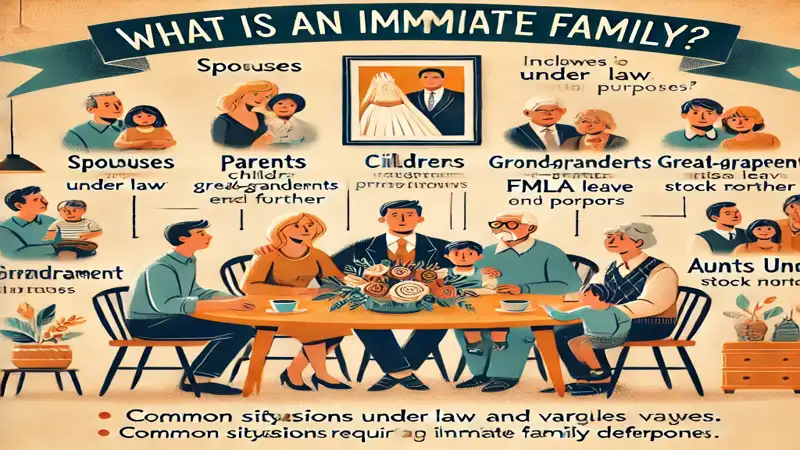
Bereavement leave is a compassionate provision that allows employees to take time off work to grieve the loss of a loved one, attend funeral services, and manage related affairs. A pivotal aspect of bereavement leave policies is the definition of “immediate family,” as it determines eligibility and the duration of leave granted. This article delves into the various interpretations of immediate family across different organizations and jurisdictions, highlighting common inclusions and the rationale behind them.
Understanding Immediate Family in Bereavement Leave Policies
The term “who is considered immediate family for bereavement leave” typically refers to an employee’s closest relatives. However, its exact definition can vary based on organizational policies, cultural norms, and legal frameworks. Commonly, immediate family includes:
Spouse or Domestic Partner
This encompasses legally married spouses and, in many modern policies, domestic partners or individuals in civil unions. Recognizing domestic partners acknowledges diverse family structures and committed relationships beyond traditional marriage.
Parents and Parents-in-Law
This category often covers biological, adoptive, step-parents, and parents of the employee’s spouse. Including parents-in-law recognizes the significant role they play in an individual’s life.
Children
Immediate family typically includes biological children, adopted children, stepchildren, and foster children. Some policies also consider individuals for whom the employee is a legal guardian.
Siblings
This generally refers to biological brothers and sisters, but many policies also include step-siblings and siblings-in-law, acknowledging the bonds formed through marriage and blended families.
Grandparents and Grandchildren
Recognizing these relationships reflects the deep familial bonds that often exist across generations.
Extended Family Members
Some organizations extend the definition to include aunts, uncles, nieces, nephews, and cousins, especially if they share a close relationship with the employee.
Individuals with a Close Association
Certain policies adopt a broader perspective by including any individual related by blood or affinity whose close association with the employee is the equivalent of a family relationship. This approach offers flexibility to accommodate diverse personal circumstances.
Variations Across Organizations and Jurisdictions
The definition of “who is considered immediate family for bereavement leave” is not universally standardized and can vary:
Organizational Policies
Companies have the discretion to define immediate family in a manner that aligns with their culture and the needs of their workforce. For instance, some organizations may offer up to five days off for immediate family members, including spouses, children, parents, siblings, and grandparents, while providing fewer days for extended family members.
Legal Definitions
Certain jurisdictions provide specific definitions. For example, the U.S. Office of Personnel Management includes spouses, parents, children, siblings, grandparents, grandchildren, domestic partners, and any individual related by blood or affinity whose close association is the equivalent of a family relationship in its definition of immediate family for leave purposes.
International Perspectives
Definitions can also vary internationally. In Australia, the Fair Work Act 2009 defines immediate family as a spouse, de facto partner, child, parent, grandparent, grandchild, or sibling of the employee, or a child, parent, grandparent, or sibling of a spouse or de facto partner of the employee.
Similarly, in the United Kingdom, bereavement leave is typically covered under an employer’s compassionate leave policy, with guidelines set by ACAS (Advisory, Conciliation, and Arbitration Service). The law does not mandate specific definitions, leaving it to employers to decide who is considered immediate family for bereavement leave.
Implications for Bereavement Leave
The classification of a relationship as immediate family directly influences an employee’s eligibility for bereavement leave and the amount of leave granted:
Duration of Leave
Employees may receive more extended leave periods for the death of an immediate family member compared to extended family. For example, a company might offer three to five days for immediate family members and one day for extended relatives.
Policy Flexibility
Organizations that adopt broader definitions of immediate family demonstrate flexibility, acknowledging the diverse and evolving nature of family structures. This inclusivity can enhance employee well-being and job satisfaction.
Legal Compliance
Employers must ensure their bereavement leave policies comply with local and national regulations, which may mandate specific definitions of immediate family and minimum leave requirements.
Recent Developments
Bereavement leave policies continue to evolve to address the diverse needs of employees:
Miscarriage Leave
In Britain, parents will soon have the right to two weeks of bereavement leave following a miscarriage before 24 weeks’ gestation, as part of Labour’s workers’ rights reforms. This change acknowledges the profound impact of pregnancy loss on individuals and couples.
Expansion of Bereavement Leave Coverage
Some companies and governments are expanding bereavement leave policies to include close friends or chosen family, reflecting changing societal norms about what constitutes a family.
Frequently Asked Questions
1. Is bereavement leave paid or unpaid?
Bereavement leave policies vary by employer and jurisdiction. Some companies offer paid leave, while others provide unpaid leave or allow employees to use personal days or vacation time.
2. Can I take bereavement leave for a close friend’s death?
Many employers restrict bereavement leave to immediate family members, but some organizations recognize close friends or chosen family. It’s best to check with your employer.
3. How do I request bereavement leave?
Most companies require employees to inform their manager or HR department, providing necessary details and, in some cases, documentation such as a death certificate or obituary.
4. Can an employer deny bereavement leave?
If bereavement leave is not legally mandated in your jurisdiction, employers have discretion over granting leave. However, many organizations recognize the importance of supporting employees during times of loss.
5. What should I do if my employer does not offer bereavement leave?
If bereavement leave is not available, employees may use vacation days, personal leave, or unpaid leave. Some labor laws may offer protections, so consulting HR or a legal professional may be beneficial.
Conclusion
Defining “who is considered immediate family for bereavement leave” is a nuanced process that reflects an organization’s values, cultural considerations, and legal obligations. By adopting inclusive and flexible definitions, employers can provide meaningful support to employees during times of loss, fostering a compassionate workplace environment.
For more update please visit my website:letflix



